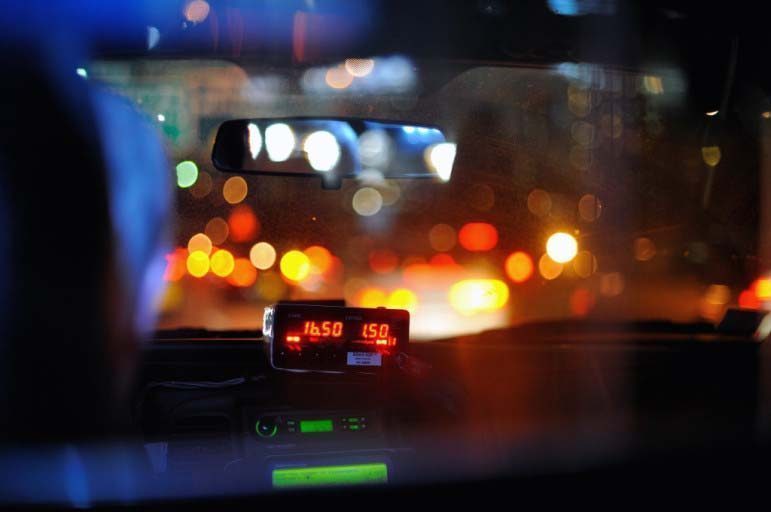
In response to complaints from residents about being cheated by taxi drivers, Qatar’s state-backed transportation company Mowasalat has begin installing new, tamper-proof meter systems in their cabs.
According to the Gulf Times, any attempts by drivers to fiddle with the meters to raise rates would be automatically flagged:
With the new meters, taxi drivers say that as soon as they try to tamper with the cables somebody from their company immediately calls them. “The new meters are now connected with some sort of electronic network so when I try to pull a cable or something, I immediately get a call from the company, asking me to verify my employee number and report to the company with the car immediately,” one driver said.
Speaking to Doha News, several taxi drivers confirmed that the meters are being installed in Mowasalat’s fleet of more than 3,000 cabs.
The first few test meters were introduced three months ago, but are now being installed at a rate of 15 taxis a week, one driver said.
The move is expected to reduce the increasing customer outrage that has ensued when drivers doctor the meter to try to charge a higher price for their services, or simply say the meter is broken and set their own rate.
A Karwa employee previously told Doha News that the most common complaints from passengers are “overpriced rates and unmetered charges, as well as a refusal to take customers to certain locations or taking more than one client and fully charging each.”
Meanwhile, drivers have said they fear explaining and defending themselves about charging higher prices, because complaints about their working conditions could get them deported.
Speaking to Doha News, an Indian taxi driver who has been with Mowasalat for eight years said:
“Drivers feel bad for what they are doing to passengers – we know it’s wrong but we are left with no other choice. We’re trapped, mistreated and misrepresented. Our management has forced us to do this.”
Mowasalat has two different structures when it comes to paying its Karwa drivers.
Some employees get a monthly salary of QR1,200. But many others work on commission and must pay Mowasalat more than QR2oo/day to rent the cars they drive.
That means they must make a minimum each day to be able to keep driving the cars, and with fares so low and traffic so congested, drivers often have a difficult time meeting or going beyond those earnings.
Another Indian driver who spoke to Doha News said that Mowasalat has not once increased the salaries of its employees during its 10 years of operation.
However, earlier this year, a Mowasalat franchisee did reduce the rental fare rate marginally after some drivers went on strike.
He continued:
“It’s a black hole. If a driver cannot make QR265 in a day then he has to pay the rental money from his pocket. If he can’t afford to pay it then he can’t go to work, and for each day of missed work we must pay QR100.
Even if we have been to the doctor and have a sick note allowing us to take some time off work, our management won’t accept it and we either have to go to work or pay QR100 a day, or QR365 a day if you are renting a car. How can anyone live like this? We all have families we are supporting back home.”
As for any car damages that occur, drivers must pay from their own pockets. They are also expected to 35 percent of the cost of repairing any accident damages.
Continuing to explain why the management is responsible for drivers’ mistreatment to passengers, the driver explained:
“There used to be a number of systems in place for us. Before, we used to get 15 percent of every QR100 made after we had made the company QR3,000. That system was taken away from us.”
There also used to be a booking system in place where bookings made at the call centre would add QR4 to the start of each passenger’s journey. From that, QR2 would go toward the company and QR2 for the driver. That also stopped about two years ago.
“What else can we do? Drivers have been doing these things because otherwise they can’t make a living,” he said.
Mowasalat did not respond to requests for comment.
Fleet expansion
Regardless of public and employee frustrations, Mowasalat has been making strides over the years. Around half of the company’s fleet are Mowasalat-run and the rest are operated by two franchisees — blue-roofed cars from Al Ijarah and maroon-roofed cars from Al Million.
The taxi firm has previously said that it aims to have 7,000 taxis running on Qatar’s roads before the 2022 World Cup. According to a Mowasalat spokesperson, a total of 4,000 taxis we be operating by the end of this year.
Earlier in 2014, Mowasalat’s CEO Khalid al-Hail said that contracts had been awarded to two new taxi franchisees. The green and yellow topped-vehicles would add an extra 1,000 cars to the road.
Under the Ibin Ajayan franchise, 300 additional taxis are expected to make an appearance this August or September, with a further 200 by the end of the year. As for the second franchise, Profit Trading & Contracting Company, an announcement will be made “soon.”
Last month, Mowasalat also furthered its expansion through the introduction of upscaled cars. New BMW series 3, 5 and 7 cars are now being used to transport some travelers from Hamad International Airport.
Mowasalat has also announced that by 2017, the taxi firm will become privatized with a total of six private firms operating the taxis.
Thoughts?